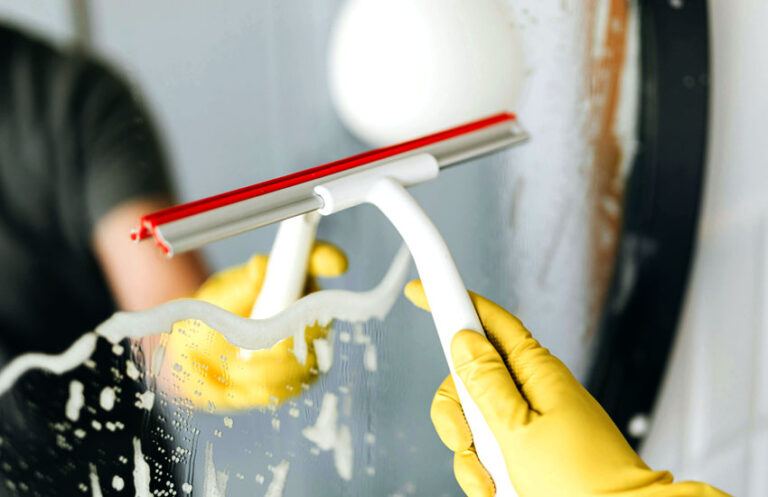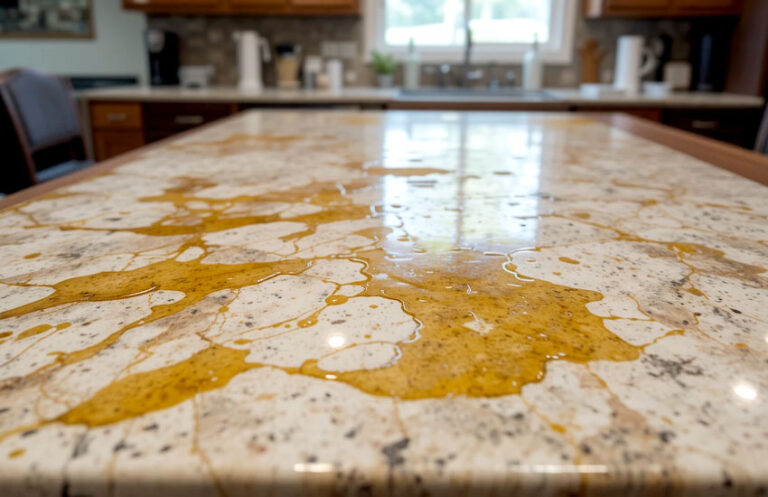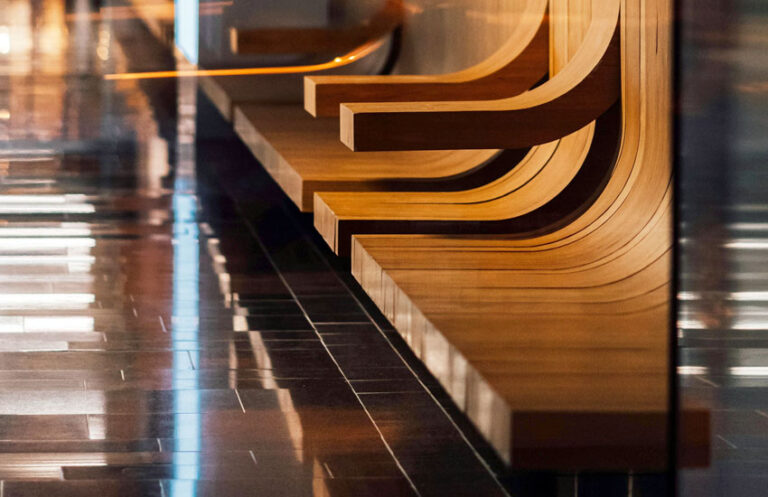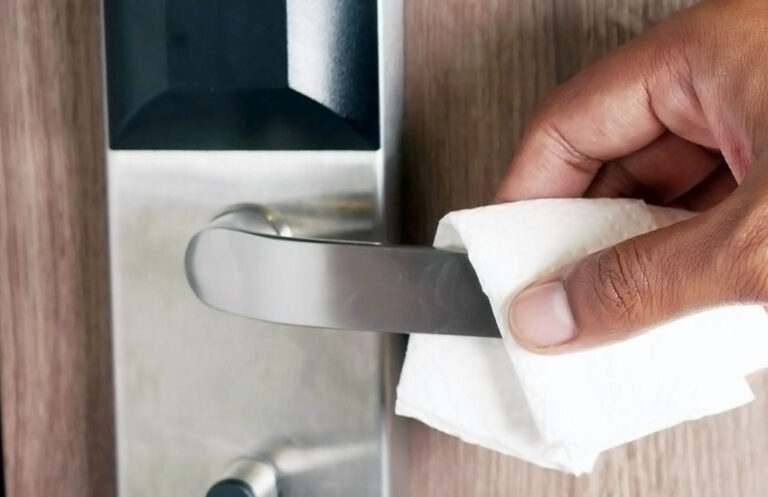As an Amazon Associate, I earn from qualifying purchases at no extra cost to you.
6 Tips to Tackle Hard Water Stains on Bathroom Surfaces
Have you ever noticed those stubborn white or cloudy stains on your bathroom surfaces that just won’t go away no matter how hard you scrub? If so, you’re not alone. These annoying marks are caused by hard water, which has high levels of minerals like calcium and magnesium. Hard water stains can make your bathroom look dirty and uncared for, even when it’s clean. Don’t worry, though – there are effective ways to tackle these tough stains and make your bathroom sparkle again. In this blog post, we’ll share six practical tips to help you remove hard water stains from your bathroom surfaces.

Understanding Hard Water Stains
Before diving into the tips, it’s important to understand what hard water stains are and why they occur. Hard water stains are caused by minerals that are left behind when water evaporates. These minerals, primarily calcium and magnesium, stick to surfaces and build up over time, creating a stubborn layer of residue. You’ll typically find these stains on faucets, shower doors, tiles, and sinks. The good news is that with a little bit of effort and the right techniques, you can get rid of them and keep your bathroom looking clean and fresh.
Tip 1: Use White Vinegar
White vinegar is a powerful, natural cleaning agent that can dissolve mineral deposits. Here’s how you can use it to tackle hard water stains:
- Soak a Cloth in Vinegar: Dampen a cloth with white vinegar and lay it over the stained area. Let it sit for 30 minutes to an hour. This gives the vinegar time to break down the mineral buildup.
- Scrub Gently: After soaking, use the cloth to gently scrub the area. For tougher stains, you can use a soft-bristled brush or an old toothbrush.
- Rinse and Dry: Rinse the surface with water and dry it with a clean towel to prevent new stains from forming.
White vinegar is particularly effective on shower doors and faucets. It’s also safe to use on most surfaces, but you should always test it on a small, hidden area first to make sure it doesn’t cause any damage.
Tip 2: Baking Soda and Water Paste
Baking soda is another household item that works wonders on hard water stains. Its gentle abrasiveness helps scrub away mineral deposits without scratching surfaces. Here’s how to make and use a baking soda paste:
- Make the Paste: Mix equal parts of baking soda and water to create a thick paste.
- Apply the Paste: Spread the paste over the stained area using a cloth or sponge.
- Let it Sit: Allow the paste to sit for 15-20 minutes. This gives it time to break down the stains.
- Scrub and Rinse: Scrub the area with a soft-bristled brush or sponge, then rinse thoroughly with water. Dry the surface with a clean towel.
This method is particularly useful for tiles and grout, as the paste can get into the small crevices and lift out the stains.
Tip 3: Lemon Juice
Lemon juice is acidic, which makes it great for breaking down hard water stains. Plus, it leaves a fresh, clean scent. Here’s how to use lemon juice to clean your bathroom surfaces:
- Cut a Lemon in Half: Use one half to scrub the stained area directly.
- Let the Juice Sit: Allow the lemon juice to sit on the stain for 10-15 minutes.
- Scrub and Rinse: Scrub the area with a cloth or sponge, then rinse with water and dry with a towel.
For a stronger solution, you can mix lemon juice with a bit of baking soda to create a paste. This combination provides both the acidity of the lemon and the abrasiveness of the baking soda, making it very effective for tougher stains.
Tip 4: Commercial Hard Water Stain Removers
If home remedies don’t do the trick, you might need a stronger solution. There are many commercial cleaners designed specifically for hard water stains. Here’s how to use them safely and effectively:
- Read the Instructions: Always read and follow the manufacturer’s instructions carefully. Some products may need to be diluted, while others can be used directly on the stains.
- Apply the Cleaner: Apply the cleaner to the stained area using a cloth or sponge.
- Let it Sit: Allow the cleaner to sit for the recommended amount of time. This can vary depending on the product.
- Scrub and Rinse: Scrub the area with a brush or sponge, then rinse thoroughly with water. Dry the surface with a clean towel.
Make sure to wear gloves and work in a well-ventilated area when using commercial cleaners, as they can contain harsh chemicals.
Tip 5: Regular Maintenance
Preventing hard water stains from forming in the first place is the best way to keep your bathroom looking great. Here are some tips for regular maintenance:
- Wipe Surfaces Dry: After using the shower or sink, take a moment to wipe down the surfaces with a towel. This prevents water from evaporating and leaving behind mineral deposits.
- Use a Squeegee: Keep a squeegee in the shower and use it to remove water from the walls and door after each use. This simple step can significantly reduce the buildup of hard water stains.
- Clean Regularly: Incorporate regular cleaning into your routine. Use a vinegar solution or a mild cleaner to wipe down surfaces weekly. This prevents the buildup of minerals and keeps stains at bay.
By staying on top of regular cleaning and drying, you can greatly reduce the amount of effort needed to tackle hard water stains.
Tip 6: Install a Water Softener
For a long-term solution to hard water stains, consider installing a water softener. Water softeners work by removing the minerals that cause hard water. Here’s how they can help:
- Prevent Stains: By removing minerals from your water supply, a water softener prevents hard water stains from forming on your bathroom surfaces.
- Protect Your Plumbing: Hard water can also cause scale buildup in your pipes, reducing water flow and efficiency. A water softener can help protect your plumbing and appliances.
- Improve Cleaning: Soft water makes it easier to clean your bathroom, as you won’t have to deal with the stubborn mineral deposits left by hard water.
While installing a water softener involves an upfront cost, it can save you time and effort in the long run by reducing the need for frequent deep cleaning.
I hope these tips help you tackle hard water stains and keep your bathroom surfaces sparkling clean. Whether you choose to use natural remedies like vinegar and lemon juice, opt for commercial cleaners, or invest in a water softener, you can effectively manage and prevent these stubborn stains. Regular maintenance and cleaning are key to maintaining a fresh and inviting bathroom. Don’t let hard water stains get you down – with a little effort and the right approach, you can keep your bathroom looking its best.
Are These Questions in Your Mind?
Is it safe to use vinegar on all bathroom surfaces?
Yes, vinegar is generally safe for most bathroom surfaces, but it’s always a good idea to test it on a small, hidden area first to make sure it doesn’t cause any damage.
Can I use baking soda on glass shower doors?
Yes, baking soda is safe to use on glass shower doors. It’s a gentle abrasive that can help scrub away hard water stains without scratching the glass.
Do I need to rinse off lemon juice after cleaning?
Yes, it’s important to rinse off lemon juice after cleaning to remove any acidic residue and prevent potential damage to surfaces over time.
Is it necessary to dry surfaces after cleaning?
Yes, drying surfaces after cleaning helps prevent new hard water stains from forming. It’s a simple step that can make a big difference.
Can commercial cleaners damage bathroom surfaces?
Some commercial cleaners contain harsh chemicals that can damage certain surfaces. Always read the manufacturer’s instructions and test the cleaner on a small area first.
Do I need a water softener if I have mild hard water?
Even if you have mild hard water, a water softener can still be beneficial. It can help prevent stains, protect your plumbing, and make cleaning easier.
Is it expensive to install a water softener?
The cost of installing a water softener can vary, but it’s a worthwhile investment for long-term prevention of hard water stains and protection of your plumbing.
Can I prevent hard water stains without a water softener?
Yes, regular cleaning and drying of surfaces can help prevent hard water stains. Using a squeegee and wiping down surfaces after each use are simple but effective steps.
Is it better to use natural remedies or commercial cleaners?
Both natural remedies and commercial cleaners can be effective. It often comes down to personal preference and the severity of the stains. Natural remedies are gentler and eco-friendly, while commercial cleaners can be more powerful.
Do I need to clean hard water stains frequently?
Regular maintenance and cleaning can prevent hard water stains from becoming severe. It’s easier to manage and remove stains when they’re dealt with promptly, rather than allowing them to build up over time.





